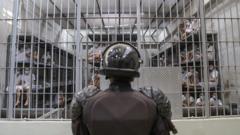Maryland's case of mistaken deportation raises questions about immigration processes
US Senator Highlights 'Traumatized' Maryland Man Deported to El Salvador

US Senator Highlights 'Traumatized' Maryland Man Deported to El Salvador
Senator Chris Van Hollen expresses concern for Kilmar Ábrego García after prison transfer
US Senator Chris Van Hollen recently returned from El Salvador, where he expressed deep concern for Kilmar Ábrego García, a Maryland man mistakenly deported by the Trump administration. Senator Van Hollen reported that Mr. Ábrego García was moved from the dangerous Cecot prison, known as the Centre for the Confinement of Terrorism, to a new facility where conditions are reportedly better. Despite the Supreme Court's order for his return to the US, the situation remains contentious as the Trump administration insists that he is part of the MS-13 gang, a claim his family staunchly denies.
During his visit, Senator Van Hollen described Mr. Ábrego García as "traumatized," highlighting that the deportee had not communicated with anyone outside the prison since his forced relocation. His first conversation was with the senator, who noted the emotional toll of the situation on Mr. Ábrego García, who maintains his innocence regarding all allegations against him. The senator also reported that, although conditions in the new prison are better, Mr. Ábrego García still lacks any means to stay informed about the outside world.
The case exemplifies ongoing tensions between immigration policy and judicial authority in the US. Multiple rulings, including from the Supreme Court, mandate the facilitation of Mr. Ábrego García's return, yet the administration persists in its stance against his re-entry. White House Press Secretary Karoline Leavitt stated unequivocally that he "will never" return to the US, echoing President Trump’s description of Mr. Ábrego García as “not a very innocent guy," despite scant evidence backing this assertion.
The Trump administration has pointed to prior allegations, including domestic incidents and a reported speeding violation, which did not result in any criminal convictions. As the legal battle unfolds over the deportation process and the administration's treatment of immigration cases, Senator Van Hollen continues to advocate for Mr. Ábrego García's rights, urging that accusations should be presented through proper legal channels rather than public discourse. The deportation of Mr. Ábrego García, alongside others, brings to light crucial discussions regarding immigration reform and judicial accountability within the rapidly evolving political landscape.
During his visit, Senator Van Hollen described Mr. Ábrego García as "traumatized," highlighting that the deportee had not communicated with anyone outside the prison since his forced relocation. His first conversation was with the senator, who noted the emotional toll of the situation on Mr. Ábrego García, who maintains his innocence regarding all allegations against him. The senator also reported that, although conditions in the new prison are better, Mr. Ábrego García still lacks any means to stay informed about the outside world.
The case exemplifies ongoing tensions between immigration policy and judicial authority in the US. Multiple rulings, including from the Supreme Court, mandate the facilitation of Mr. Ábrego García's return, yet the administration persists in its stance against his re-entry. White House Press Secretary Karoline Leavitt stated unequivocally that he "will never" return to the US, echoing President Trump’s description of Mr. Ábrego García as “not a very innocent guy," despite scant evidence backing this assertion.
The Trump administration has pointed to prior allegations, including domestic incidents and a reported speeding violation, which did not result in any criminal convictions. As the legal battle unfolds over the deportation process and the administration's treatment of immigration cases, Senator Van Hollen continues to advocate for Mr. Ábrego García's rights, urging that accusations should be presented through proper legal channels rather than public discourse. The deportation of Mr. Ábrego García, alongside others, brings to light crucial discussions regarding immigration reform and judicial accountability within the rapidly evolving political landscape.




















